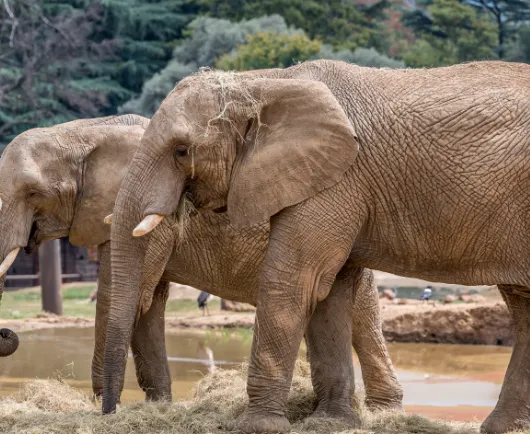Harvard academics join call for the release of elephants from Johannesburg Zoo

Harvard academics allowed to join a court case for the Johannesburg Zoo to release three elephants to a sanctuary.
Image: Instagram
The voices of two academics at the Harvard Law School will be added to the main application launched by animal welfare groups in which they are calling for the release of three elephants from the Johannesburg Zoo.
The Gauteng High Court, Pretoria ordered that the academics may be added as friends of the court as they can deliver important insight into the application brought by Animal Law Reform South Africa, the EMS Foundation and Khoi Chief Stephen Fritz.
They will at a later stage ask the court to order the confinement of Lammie, Mopane and Ramadibato to be unconstitutional.
The court case has gained international attention from the Harvard academics, who want to join the matter to highlight the elephants’ complex needs and the broader ethical implications.
Professor Kristen Stilt and Dr Montes Franchesini at Harvard’s Law School’s Brooks McCormick animal law and policy program are experts in animal law and policy, who have previously authored and contributed to amicus (friend of the court) briefs before courts in other countries.
These contributions were in cases concerning the welfare and protection of animals held in captivity. They want to make legal submissions, in writing and orally, at the hearing of the main application. The submissions pertain to international law and foreign jurisprudence concerning the protection of animals and nature.
The Johannesburg Zoo, the City of Johannesburg and other respondents in the main application opposed this application on the grounds that no constitutional issue has been squarely raised. They also objected on the ground that submissions on international trends and practices, including questions of constitutionality, would not be of assistance to the court in this matter.
Judge Anthony Millar remarked that while there is no direct impugning of any of the relevant legislation, the argument advanced in the main application is somewhat more nuanced and less blunt than the respondents argue it should be.
The applicants and the Harvard academics meanwhile argued that the constitutional issues on which the court will have to decide in the main application is whether the continued captivity of the elephants at the Johannesburg Zoo is in violation of the Constitution. The respondents have, in turn, placed this issue in dispute, as they deny any violation and contend that they have acted consistently with their constitutional duties.
Judge Millar said this is in his view clearly a constitutional issue that the court hearing the main application will be required to consider and decide, although not formulated as an attack on legislation.
“It is not in issue that the amici applicants are experts in their field and are able to bring an international perspective on how the keeping of elephants in captivity has been addressed in other jurisdictions,” he said.
It was argued for the amici applicants that they have prepared a detailed research brief that addresses the relevant international and foreign jurisprudence concerning the protection of animals, including Spanish language case law that would otherwise be inaccessible to a South African court.
Their survey of relevant foreign law includes cases like this, where courts have been faced with applications for the release of elephants and other animals from zoos and other places of captivity.
Judge Millar said it is in the interests of justice, given the issues raised in the main application, that the amici applicants be admitted.
zelda.venter@inl.co.za